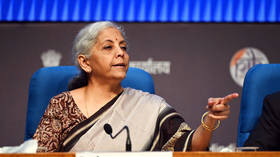Blood money: world banks invest in cluster bombs
Over 90 countries have pledged to ban cluster bombs, which claim thousands of lives even years after a conflict. Activists say change is unlikely, as long as major world banks continue to invest in weapons development.
Cluster bombs kill and maim indiscriminately and are hard to detect. They open mid-air and scatter hundreds of smaller explosives over a wide area. They can remain dormant for years, eventually striking innocent civilians as they go about their daily lives.
“One bomb can cover a couple of football fields in one shot and so many of them fail to explode,” said Thomas Nash of the Cluster Munition Coalition. “You end up with basically fields of land mines that can remain for decades, killing and injuring people long after the conflict.”
Despite global calls for a ban, banks continue pumping billions into cluster munitions, including two of Britain’s biggest names: HSBC has underwritten $665 million bonds for Textron, the US firm which claims its products leave a “clear battlefield.” Barclays Bank lent $222 million, as well as funding Lockheed Martin.
While nations sign up to a convention to outlaw clusters, lenders are dodging the detail.
”The convention itself does not explicitly ban investment in cluster munitions,” said Roos Boer of IKV Pax Christi organization for peace. “It does however contain one prohibition on assistance on production. We feel very strongly that assistance on production means investing. If you invest in a company you assist [in] the production of these deadly weapons.”
There are currently 77 nations who stock cluster bombs.
With 31 countries still polluted and suffering the after effects of the munitions.
98% of cluster bomb casualties are civilians.
And 30% of those are children.
That's according to Handicap International.
“They have customers worldwide who have given their trust in these companies and we feel it is up to these banks to end this involvement because these customers do not want their money to be invested in these producers of cluster munitions,” said Esther Vanderbroek of Netwerk Vlaanderen.
The activists’ protests demanded answers from London’s banks. Only Barclays responded, touting its anti-cluster policy, but admitting it lent money to Textron as a “broad-based weapons manufacturer.”
90 countries have committed to banning clusters by next year, but only a quarter have so far made it law. The US has not even signed up. Israel used them against Lebanon in 2006, and they have been used in both Iraq and Afghanistan.
Governments and weapons manufacturers undoubtedly have blood on their hands over cluster munitions. But although lawmakers may be in charge, it is the banks which hold the keys to the cash. Campaigners say that, until they work together, there is little to stop the trade in gruesome, horrific death.













